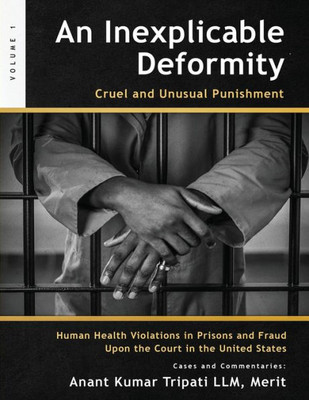
Sale
An Inexplicable Deformity: Cruel and Unusual Punishment
Sureshot Books Publishing LLC
ISBN13:
9781947170100
$29.99
$27.63
An Inexplicable Deformity Volume 1 This book has been painstakingly researched and written in hopes of enabling the basic humane treatment for all those incarcerated in the United States today and in the future. Mr. Tripati has specializations in Public International Law, Public Law, and European Law. The Prison Litigation Reform Act (PLRA) and its counterpart the Antiterrorism And Effective Death Penalty Act Of 1996 (AEDPA) violate Art 2.3(a) ICCPR for they require exhaustion of ineffective administrative and judicial remedies Eugene Novikov, Comment Stacking The Deck: Futility And The Exhaustion Provision Of the Prison Litigation Reform Act, 156 U. Pa .L .Rev. 817 (2008) Mark Tushnet & Larry Yackle, Symbolic Statutes And Real Laws: The Pathologies Of The Substances Of The Antiterrorism And Effective Death Penalty Act and the PLRA, 47 Duke L.L. 1 (1997). In Ross v Blake, (2016) No. 15-379 Justice Kagan stated "as Booth made clear an administrative procedure is unavailable when (despite what regulation or guidance materials may promise) it operates as a simple dead end...with officers unable or consistently unwilling to provide any relief to aggrieved inmates. In short PLRA renders all remedies for prisoners ineffective within the meaning of Art. 2.3(a) ICCPR. Because of Congressional restrictions prisoners, notwithstanding the fact that they are being subjected to human rights abuses in state prisons, do not have the same access to the courts as non-prisoners, and the limited access they have are futile, under a heightened standard. During litigation prison authorities are allowed to conceal evidence of misconduct and do not have to provide the same disclosure that non prisoners are given Rule 26(a)(1)(B)(iv) Federal Rules of Civil Procedure. As such prisoners' accesses to courts violate Art. 14.1 ICCPR. Frowein and Perkert, Europaische Menschenrechts Konvention: EMRK-Kommentar; (2nd ed. 1996) Because of PLRA prisoners are increasingly tortured, subjected to cruel, inhumane, degrading treatment and punishment in violation of Art. 7 ICCPR; Green, The European Court Of Human Rights, (2006) prisoners are not treated with humanity as required by Art. 10.1 ICCPR; their rights to freedom of thought, conscience, religion as required by Art. 18.1 and 27 ICCPR is violated; retaliation for petitioning the courts and government is the norm in violation of Art. 25.a ICCPR. In short PLRA encourages ICCPR and human rights violations Malcolm M. Feley & Van Swearingen, The Prison Conditions Cases and The Bureaucratization Of American Corrections: Influences, Impacts and Implications; 24 Pace L. Rev. 433 (2004) describes the increase in prison litigation due to prison authorities that violation human rights How Prisoners' Rights Lawyers Are Preserving the Role Of the Courts, 69 U. Miami L. Rev. "The Degree of a civilization can be judged by entering its prisons"
- | Author: Merit Anant Kumar Tripati LLM
- | Publisher: Sureshot Books Publishing LLC
- | Publication Date: Dec 17, 2018
- | Number of Pages: 392 pages
- | Language: English
- | Binding: Paperback
- | ISBN-10: 1947170104
- | ISBN-13: 9781947170100
- Author:
- Merit Anant Kumar Tripati LLM
- Publisher:
- Sureshot Books Publishing LLC
- Publication Date:
- Dec 17, 2018
- Number of pages:
- 392 pages
- Language:
- English
- Binding:
- Paperback
- ISBN-10:
- 1947170104
- ISBN-13:
- 9781947170100





